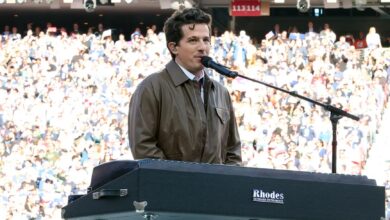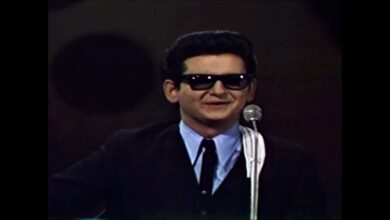Bruce Springsteen walked onto the stage with just his guitar in hand and delivered a stirring, stripped-down version of Bob Dylan’s “The Times They Are A-Changin’.”
On a night forever etched into the collective memory of American music, Bruce Springsteen walked onto the stage at the 1997 Kennedy Center Honors and delivered something more profound than a tribute. With nothing but his guitar and signature voice, he offered a powerful rendition of Bob Dylan’s “The Times They Are A-Changin’.” This wasn’t merely a performance—it was an invocation, a solemn salute, and a spark that reignited a timeless anthem with fresh urgency.
Inside the opulent walls of Washington, D.C.’s Kennedy Center, the atmosphere brimmed with elegance and reverence. Celebrities, politicians, and cultural icons filled the hall, but all eyes turned when Springsteen appeared under a wash of soft light. Dressed in black, he didn’t command attention with spectacle, but with stillness. A single strum of his guitar shifted the mood in the room—instantly intimate, immediately important.
Opening with the familiar call, “Come gather ’round people wherever you roam,” Springsteen didn’t just cover Dylan’s words—he carried them forward. His voice, gritty and resonant, felt like a weathered call from the front lines of change. Rather than evoke nostalgia, he invited reflection. His delivery made it clear: this song wasn’t locked in the 1960s—it was alive, relevant, and speaking directly to the present.
As the chorus echoed through the auditorium, the effect was magnetic. Attendees leaned forward, captivated by the simplicity and sincerity. There were no flashing lights, no soaring orchestrations—just Springsteen, his guitar, and a message. His performance stitched past and present together, giving Dylan’s lyrics new weight without altering a single word. He wasn’t just singing the song—he was living it.
What made the moment so striking was its purity. Stripped of theatrics, the performance was raw and reverent. Springsteen didn’t aim to reinterpret Dylan’s work—he allowed the message to speak through him, plainly and powerfully. Each line felt deliberate, loaded with conviction and shaped by experience. It was a reminder that sometimes the most powerful statement is the one said simply and truthfully.
Sitting in the audience, Dylan remained his usual enigmatic self, but even he couldn’t mask a small, knowing smile. It was a subtle gesture, yet it carried immense meaning. It said the message had landed—not as an echo from the past, but as a call still ringing out in the present. In that smile was a quiet acknowledgment: the torch had been passed, and the flame was still strong.
Springsteen’s tribute went beyond mere celebration. It reminded the audience that Dylan’s words still matter—not because they’re historic, but because they continue to speak to the struggles and hopes of today. In Bruce’s hands, “The Times They Are A-Changin’” became not a museum piece, but a living protest, a living promise.
Long after the applause faded, the performance lingered. It left a mark—a sense that change isn’t just possible, but necessary. Through Springsteen’s interpretation, the song felt reborn, not reinvented, carrying the same fire it had when it first lit the streets of protest decades ago. It reminded everyone listening that music can still challenge, still inspire, still move mountains.
Even backstage, the weight of the moment was felt. Conversations turned reflective, crew members paused with reverence, and the usually polished energy of the event gave way to something more profound. Bruce hadn’t just performed—he’d channeled a voice that had shaped generations, offering it back to the world with deep respect and undeniable strength.
On that evening, Bruce Springsteen did more than honor Bob Dylan—he reminded the world why these songs still matter. He gave the lyrics new breath, the melody new urgency, and the message new reach. It was a moment that cut through time, proving once again that great music isn’t just heard—it’s felt, and it never stops echoing.



